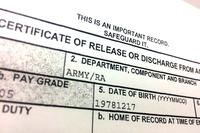Almost every young recruit hears this question: "Why did you come into the military?" Of course, every person who wears the uniform has more than one answer, and all of the answers are usually very good ones.
One of the most important aspects of military service is the long-term educational benefits. Thousands of veterans use the Montgomery GI Bill benefits every year; it's a great return on the investment of time (and a small amount of money) the military individual sowed into their future.
Many of these veterans seek vocational or career training designed to assist in a smooth transition from active-duty or reserve-duty life into satisfying, rewarding -- and well-paying -- jobs once they reenter "the world."
There are some great tips that every veteran should be aware of as they return to "civilian life." Here are a few of the most important ones:
First, remember that while educational benefits last awhile, they don't last forever. There is a limit (both dollarwise and timewise) to the Montgomery GI Bill, as well as other benefits offered to the new "civilian." These time limits are normally 10 years from the date of separation. There are no extensions, so use them in the time frame you have.
These are your benefits, so do not let them expire without using them.
Second, if you want to get the skills that will propel you into a vocational career (electricians, HVAC tech, medical techs, etc.), then your best option is a career college or post-secondary vocational school. Not everyone wants to attend a four-year college, and now military veterans have many other options.
Most all career colleges and vocational schools will offer college credit for the programs you have completed with them. Career colleges and post-secondary vocational institutions normally offer "hands-on" training in their specialties.
Third, since the pay rates for the Montgomery GI Bill increased (effective Oct. 1, 2006), you can afford to attend a career college or postsecondary vocational institution. Most schools will help you file all the necessary paperwork for your well-deserved and earned benefits.
These benefits will go a long way in helping you minimize long-term (and expensive) student loans, when used appropriately. Why assume more debt than necessary? Use the GI Bill benefits to your long-term advantage at a vocational/postsecondary career school.
Finally, most career schools assist with job placement and career development during the veteran's course of study, upon graduation and for a long time afterward. These schools want to see military veterans succeed in the civilian world, just as they succeeded in serving our country.
Everyone benefits when this happens -- the veteran who has received training and the employer who hires the now-trained veteran.
Now is the time to start exploring "after-the-military" options if you plan to return to civilian life in the not-so-distant future.
Check out the vocational schools around the country. Find out what the labor market looks like, in comparison to what you want to do in the future. Find out about job placement assistance and what these institutions have to offer you, the military veteran. You have served them well; now allow them the opportunity to serve you well.
Phil Hoover, a 10-year U.S. Air Force veteran, is an admissions representative for Coyne American Institute (www.coyneamerican.edu) in Chicago. Coyne is one of the oldest continuing post-secondary vocational schools in the United States. Whether the career is electrical construction and maintenance, electronic systems or heating-air conditioning-refrigeration, Coyne American Institute is a well-respected leader in vocational training and job placement assistance.
Editor's Note: Coyne American Institute, later Coyne College, closed in 2022.
The Next Step: Get Veteran Jobs Tips
Looking for transition and veteran jobs tips? Military.com has you covered. Subscribe to Military.com to have military news, updates and job resources delivered directly to your inbox.











